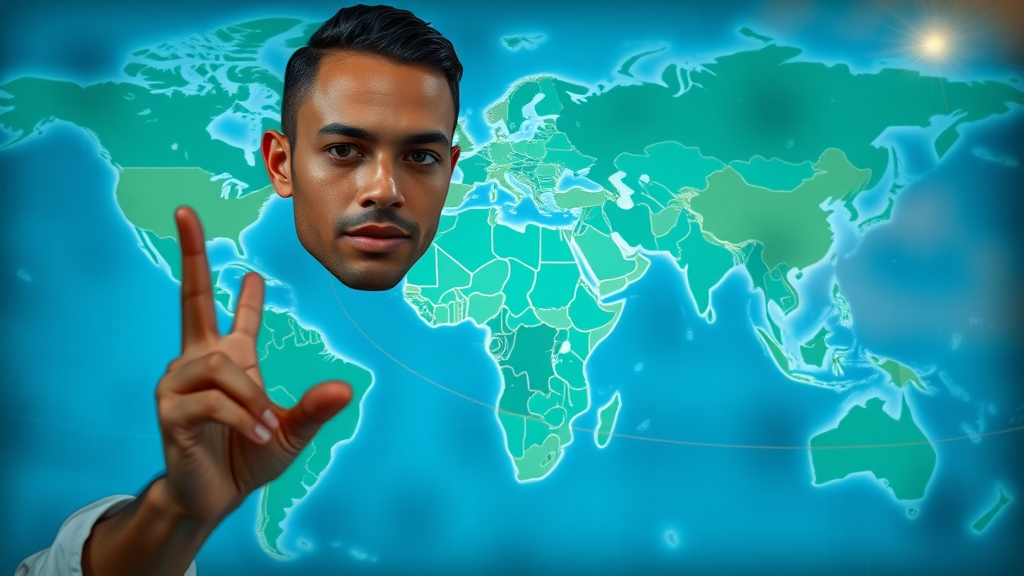Startling Growth of African AI Development: A New Frontier – Did you know that thousands of new AI developers are emerging from Africa, poised to create the next global AI breakthrough? In this article, we dive deep into the evolving AI landscape across Africa, uncover the challenges, and learn from industry pioneers including Strive Masiyiwa , Founder & Executive Chairman of Econet Group . Discover how African youth innovation and strategic investments can transform the continent into a global AI powerhouse.

Startling Growth of African AI Development: A New Frontier
- Thousands of new AI developers emerging from Africa — Data shows a rapid increase in AI app developers registering from Africa, signaling a vibrant tech evolution on the continent.
- Potential for Africa to produce the next global AI solution — Experts predict that Africa could soon deliver breakthrough AI innovations akin to TikTok’s global impact.
- Strive Masiyiwa’s perspective on Africa’s AI future — Masiyiwa asserts Africa is set to surprise the world by moving from the back of the queue to a leadership position in AI.
“Africa is going to surprise a lot of people who think we are somehow preordained to be at the back of the queue.” – Strive Masiyiwa, Founder & Executive Chairman, Econet Group
Overview of Artificial Intelligence and AI Development in Africa
- Definition and scope of artificial intelligence : AI encompasses technologies capable of performing tasks requiring human intelligence like learning, problem-solving, and pattern recognition. Its applications range from healthcare diagnostics to fintech solutions.
- Current state of AI development in Africa : African countries are witnessing accelerated AI growth marked by startups, increasing developer communities, and emerging AI-centric policies.
- Key sectors impacted by AI solutions in Africa : AI is transforming healthcare , education , fintech , and agritech sectors, delivering localized, scalable solutions addressing Africa’s unique challenges.
The Role of AI Solutions in Driving African Development
- How AI solutions address local challenges : From predicting crop yields in agritech to enhancing disease diagnosis in health systems, AI helps overcome infrastructural and resource limitations.
- Examples of innovative AI applications emerging from Africa : Startups utilizing machine learning for mobile banking fraud detection and adaptive learning platforms in education showcase African ingenuity.
- Importance of responsible AI in African contexts : Ethical AI deployment is critical to avoid bias, ensure privacy, and foster trust within diverse and sensitive local communities.


Breaking Barriers: Overcoming Compute Challenges for AI in Africa
- Strive Masiyiwa’s initiative to provide accessible GPU compute time : By establishing infrastructure for affordable GPU rentals, Strive Masiyiwa addresses a major barrier limiting AI experimentation and development on the continent.
- Impact of affordable compute resources on AI development : Access to scalable compute empowers African developers to deploy complex AI models, enhancing productivity and product innovation.
- Pre-orders and demand from African AI entrepreneurs : The overwhelming demand for compute time reflects a ready and eager developer base prepared to launch transformative AI applications.
“After the Global AI Summit in Kigali, I cleared the biggest hurdle for AI in Africa today: compute.” – Strive Masiyiwa, Econet Group

How Compute Access Enables Scalable AI Solutions
- Enabling businesses across sectors with AI : Affordable compute capacity means sectors like healthcare, fintech, and agriculture can harness AI-driven insights and automation at scale.
- Potential for new AI products in gaming, cryptocurrencies, fintech, and agritech : African innovators are crafting solutions ranging from blockchain-enabled financial services to AI-assisted farming tools and gaming platforms.
- Future expansion plans for compute infrastructure : Plans to expand GPU infrastructure aim to keep pace with growing developer demand, fostering AI innovation ecosystems across Africa.

African AI Leadership: Harnessing Youth Innovation and Entrepreneurship
- Youth as natural innovators and entrepreneurs in AI : African youth, equipped with digital literacy and creativity, are naturally positioned to lead AI innovation across diverse industries.
- Importance of specialized skills for AI leadership : Developing expertise in machine learning, data science, and AI ethics enhances the capability of young entrepreneurs to solve complex problems.
- Encouragement to identify problems and apply AI solutions : Strive Masiyiwa urges the youth to look beyond limitations and focus on creating impactful AI solutions for everyday challenges.
“Use your youth to hyperdrive your mind to find solutions, rather than see only problems and limitations.” – Strive Masiyiwa, Econet Group

Responsible AI and Ethical Considerations in African AI Development
- Importance of responsible AI practices in Africa : Integrating fairness, transparency, and accountability ensures AI benefits are equitable and culturally appropriate.
- Balancing innovation with ethical AI deployment : Ethical frameworks guide AI development while encouraging innovative applications tailored to African societal needs.
- Global and local frameworks guiding AI responsibility : African AI initiatives align with international standards like GDPR and adapt to regional ethical norms to promote trust and safety.

Comparing African AI Development with Global Trends
- Which African countries are leading in AI? Kenya, Nigeria, South Africa, and Egypt are often cited as AI hubs due to investments in infrastructure and growing developer ecosystems.
- Global leaders in AI and lessons for Africa : AI giants like the U.S., China, and the EU inform Africa’s strategies in areas such as research funding, policy frameworks, and ethical AI governance.
- How African AI strategies align with global standards : African nations adopt global best practices while tailoring approaches to local contexts for maximum relevancy and impact.
| Region | Leading Countries | AI Strategies | Investment Levels | Innovation Outputs |
|---|---|---|---|---|
| Africa | Kenya, Nigeria, South Africa, Egypt | National AI frameworks, focus on fintech and agritech | Growing but limited relative to global leaders | Emerging AI startups, health diagnostics, mobile solutions |
| Global Leaders | USA, China, EU Countries | Comprehensive AI policy, R&D investment, ethical oversight | High, with billions in public and private funding | Advanced AI products in autonomous vehicles, NLP, and robotics |

People Also Ask: Key Questions on AI Leadership Africa
- Which African country is leading in AI? Kenya, Nigeria, and South Africa are recognized as leaders due to strong developer communities and government initiatives.
- Who is the AI expert in Africa? Strive Masiyiwa of the Econet Group is a prominent visionary spearheading AI growth and infrastructure access.
- Which country is the world leader in AI? The United States is widely regarded as the global leader with significant investment and innovation outputs.
- Which African countries have AI strategies? Kenya, South Africa, Ethiopia, and Nigeria have formal strategies and policies promoting AI development.

Expert Insights & Best Practices for AI Leadership Africa
- Insights from Strive Masiyiwa and other industry pioneers : Masiyiwa emphasizes removing barriers like compute access and fostering youth-led innovation as keys to AI success in Africa.
- Best practices for fostering AI innovation in Africa : Collaborative ecosystems, ethical AI frameworks, and investment in skills and infrastructure drive sustainable AI leadership.
- Strategies to build sustainable AI ecosystems : Encouraging partnerships between governments, academia, and private sectors ensures long-term AI ecosystem resilience.
Key Takeaways: Building Africa’s Future as a Global AI Leader
- Africa’s growing AI developer community is a powerful asset —with thousands of emerging talents ready to innovate locally and globally.
- Access to compute resources is critical for AI innovation , as demonstrated by infrastructure initiatives removing key technical barriers.
- Youth-driven entrepreneurship will shape Africa’s AI future by leveraging creativity and specialized skills to solve real-world problems.
- Responsible AI practices ensure sustainable development by embedding ethics alongside rapid innovation.
- Collaboration and investment are essential for scaling AI solutions across sectors and geographies within Africa.

Conclusion: The Path Forward for AI Leadership Africa
- Africa’s AI potential is immense but requires continued effort to develop infrastructure, talent, and supportive policies.
- Stakeholders must invest in infrastructure, skills, and ethics to maintain sustainable AI growth and global competitiveness.
- The next generation of African AI leaders is ready to emerge —equipped with the vision and technology to redefine the continent’s future.
“The future of AI is not about replacing humans; it’s about augmenting human capabilities.” – Sundar Pichai
Call to Action
- Discover Africa Frontline Media Channels For More AI And Technology News and become part of the transformative AI journey in Africa.
Africa’s journey toward becoming a global leader in artificial intelligence (AI) is marked by significant initiatives and visionary leadership. The African Union has adopted a Continental AI Strategy, aiming to integrate AI into the continent’s development agenda, fostering economic growth and inclusive digital transformation. ( au.int ) In Kenya, leaders like Philip Thigo are reimagining technology leadership by integrating AI into key industries to meet Sustainable Development Goals by 2030. ( brookings.edu ) Additionally, the Smart Africa Alliance has endorsed the establishment of the Africa Artificial Intelligence Council to coordinate AI infrastructure, skills enhancement, and governance policies across the continent. ( cioafrica.co ) These efforts underscore Africa’s commitment to harnessing AI for socioeconomic transformation and positioning itself as a key player in the global AI landscape.
 Add Row
Add Row  Add
Add 




Write A Comment